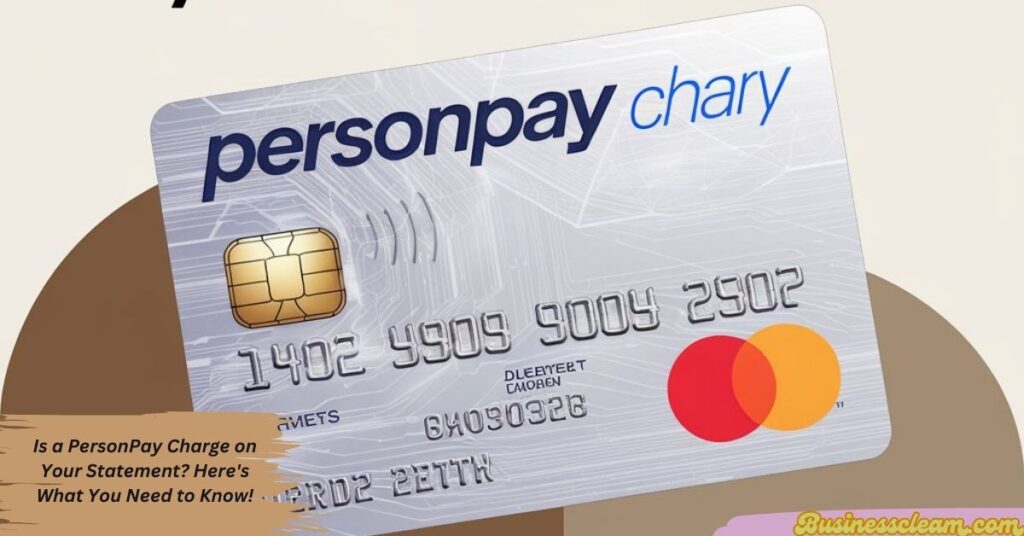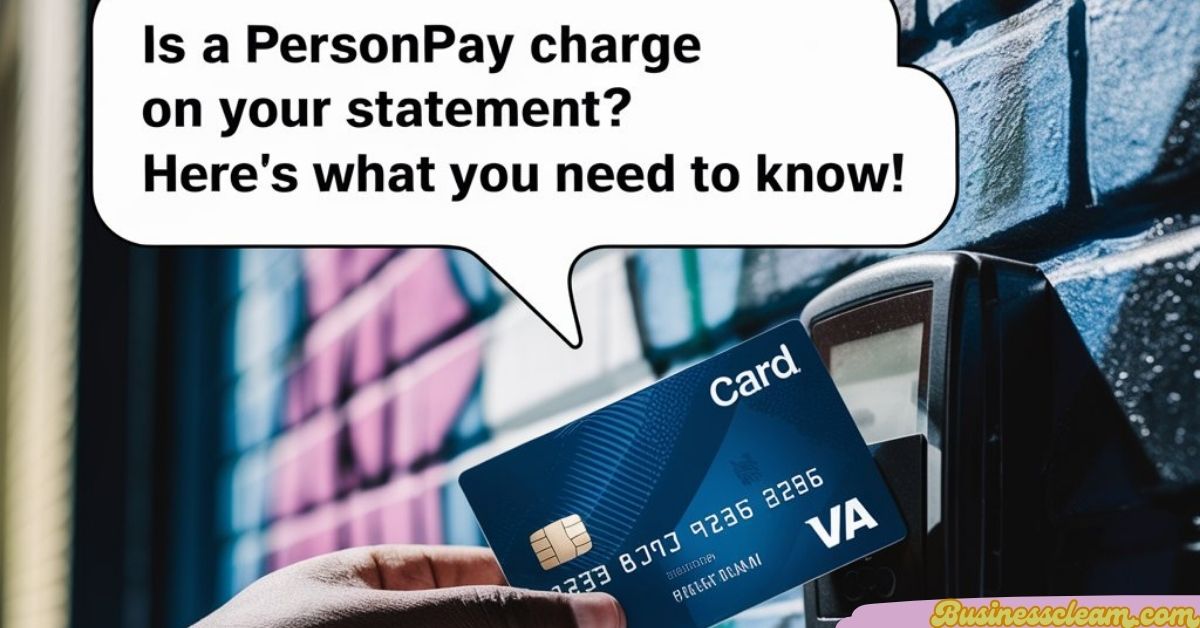If you’ve noticed a PersonPay charge on your bank or credit card statement, you might be wondering what it is. A PersonPay charge typically refers to a payment made through an online platform used by various services. This payment processor helps companies handle billing for subscriptions, digital goods, or online services. Understanding this charge is important to make sure it’s valid and authorised.
Are you puzzled by a charge that you don’t recognize? It can be frustrating to find unfamiliar transactions on your statement. But don’t worry! We’re here to break down what this charge means and how you can figure out where it’s coming from. Let’s dive into why a PersonPay charge might appear and what to do about it.
A PersonPay charge often appears when you sign up for an online service or subscription. It can also show up due to an automatic renewal or a forgotten trial period that converted into a paid plan. While some charges are legitimate, others may be mistakes or fraud. Identifying the source of these charges quickly can help you take the necessary steps to resolve any issues.
What is PersonPay?
PersonPay is an online payment service that handles payments for various subscription-based services. It is often used by companies that offer digital goods, online courses, personality tests, or other services. When you sign up for these services, PersonPay may be listed as the payment processor on your statement.
Here are some examples of what PersonPay might be linked to:
- Personality tests and quizzes that charge after a trial period.
- Subscription services for access to online content like e-books, videos, or courses.
- Online marketplaces or platforms that require payment for a service.
It’s also important to note that PersonPay is often a payment gateway for services you may have signed up for unknowingly during free trials or subscription renewals. If you’re unsure about a charge, check your recent sign-ups to see if you enrolled in any services recently.
How Did PersonPay Charges Appear on Your Statement?
PersonPay charges usually appear on your statement due to a few reasons, and most often, they are linked to automatic renewals or forgotten subscriptions.
Here are a few common reasons why this charge might appear:
- Forgotten Subscriptions: Many people forget about subscriptions they signed up for, especially if there was a free trial involved. These subscriptions might automatically renew after the trial ends.
- Automatic Renewal: Some services automatically renew at the end of a billing cycle, and the charge appears under PersonPay if that’s the payment gateway they use.
- Linked Services: Sometimes, charges are for services you didn’t realize were connected to PersonPay. For example, you might have subscribed to a service through an app or website that uses PersonPay for billing.
How to Track Down the Source of the Charge

If you see a PersonPay charge and you don’t recognize it, here’s how to track down where it came from:
- Check Your Email for Confirmation: Look for any emails confirming your subscription to a service, especially if it was a free trial that converted into a paid plan.
- Review Your Subscriptions: Log in to any online platforms or apps where you might have subscriptions. Services like Netflix, Spotify, or online learning platforms might use PersonPay without your knowledge.
- Contact the Provider: If you still can’t figure it out, you can always reach out to PersonPay customer support. They can help identify which service or company is billing you.
- Recommended Blog : How to Handle Discovery Digital Ventures Charges on Your Credit Card
What To Do if You Don’t Recognize the Charge
If you don’t recognize the charge and you’re worried about fraud or an unauthorized transaction, here’s what to do:
- Contact PersonPay Support: The charge may be legitimate, but if it’s still unclear, you can contact PersonPay’s support team. You can reach them via email at support@personpay.net or call their customer service at 855-342-8558.
- Dispute the Charge: If the charge appears to be fraudulent, you can contact your bank or credit card provider to dispute it. They will investigate the transaction and may refund the charge if it is unauthorized.
- Report Fraud: If you suspect fraud, you should also report the charge to your bank or credit card company immediately. They will guide you through the process of protecting your account.
How to Protect Yourself from Unexpected Charges in the Future
To avoid these unexpected PersonPay charges in the future, here are a few steps you can take:
- Review Subscription Terms: Always read the fine print when signing up for any online service. Some companies may automatically enroll you in paid subscriptions after a free trial.
- Monitor Your Statements: Keep an eye on your bank and credit card statements. Regular monitoring can help you spot suspicious charges early on.
- Set Up Alerts: Many banks offer transaction alerts that notify you of charges made to your account. This is a great way to stay informed.
- Use Secure Payment Methods: Consider using more secure payment methods, such as PayPal or virtual cards, which make it easier to track and control payments.
Legal Help for Disputing Charges
If you’ve already taken the above steps and are still unable to resolve the issue, you may need to seek legal advice. In some cases, a lawyer can help you navigate the PersonPay dispute process, especially if there’s evidence of fraud or unauthorized charges.
A legal professional can:
- Assist in filing complaints with consumer protection agencies.
- Help you understand your rights regarding billing disputes.
- Guide you through legal channels if the service refuses to resolve the issue.
Conclusion: Stay Informed and Take Action
Unexpected PersonPay charges can be frustrating, but with the right steps, you can identify the source and take action quickly. Remember to check your email and subscriptions, contact support, and dispute any fraudulent charges with your bank. By staying informed and vigilant, you can avoid similar issues in the future.
If you’re still unsure about a PersonPay charge on your statement, don’t hesitate to reach out to support. The sooner you act, the easier it is to manage these charges and protect your finances.
Frequently Asked Question
What is a PersonPay Charge?
A PersonPay charge is a payment that appears on your statement when you use an online payment processing service for subscriptions, digital products, or services. It typically appears as a charge for an automatic renewal or a paid subscription. If you don’t recognize it, it may be due to a forgotten subscription or trial period that converted into a paid plan.
Why Did I Get a PersonPay Charge?
You might receive a PersonPay charge because you unknowingly signed up for a service that uses this platform for billing. It could be linked to a free trial that turned into a paid subscription or an auto-renewal for a service you no longer use. Review your recent subscriptions or check your email for confirmation of the charge.
How Can I Find Out What the PersonPay Charge Is For?
To identify what the PersonPay charge is for, start by reviewing any recent online purchases, services, or subscriptions you may have forgotten about. You can also check your email for receipts or confirmation of any subscriptions. If the charge is still unclear, reach out to PersonPay customer service for more details.
How Do I Dispute a PersonPay Charge?
If you believe a PersonPay charge is unauthorized or incorrect, contact the payment processor or your bank to dispute it. You can contact PersonPay support directly, or your bank can help you investigate the transaction. Be sure to have any relevant details on hand, such as the date and amount of the charge.
How Can I Avoid Unexpected PersonPay Charges in the Future?
To avoid surprise PersonPay charges, regularly review your subscriptions and account settings. Set reminders for free trials, and cancel any services you no longer want. Many banks also offer alerts for any charges, which can help you stay on top of your statements and avoid unplanned payments.

Michael Leo is a seasoned entrepreneur with a passion for business growth and innovation. With years of experience in driving success across industries, he specializes in crafting strategies that deliver results. Michael’s expertise lies in leadership, problem-solving, and leveraging market trends to maximize opportunities. His mission is to empower businesses to reach their full potential through tailored solutions and actionable insights.




